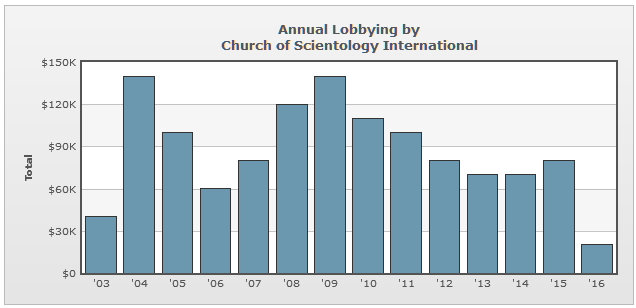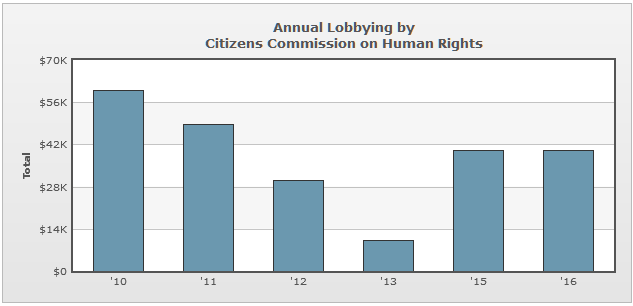Church of Scientology US Lobbying
Lobbying in the United States describes paid and pro bono activity in which special interests hire well-connected professional advocates, typically lawyers and former bureaucrats, to argue for or against specific legislation and regulations in decision-making bodies of government. It is a highly controversial phenomenon, often seen in a negative light by journalists and the American public when corporations use lobbying as a means of gaining influence for the benefit of their own profitable.[1] While the bulk of lobbying happens by business and professional interests who hire paid professionals, some lobbyists represent non-profits pro bono for social issues. Pro bono lobbyists typically coordinate advocacy activities to sway public opinion, form like-minded coalitions for promoting a common cause and socialize with local legislators at events like fundraisers and awards ceremonies.[2] Public disclosure documentation shows that the Church of Scientology lobbying activities primarily focuses on two areas: corporate interests related to swaying legislation and regulatory actions that financially benefits one or more of their organizations; and foreign policy leverage for enlisting help when other countries deny them the same non-profit tax breaks or religious freedoms they enjoy in the United States.
Annual spending summary
Public records readily available online from the Center for Responsive Politics, the US House of Representatives and the US Senate reflect a downward trend of money spent by Scientology entities on lobbyist activities.
Religious Technology Center
 http://www.opensecrets.org/lobby/clientsum.php?id=F22357
http://www.opensecrets.org/lobby/clientsum.php?id=F22357
Church of Scientology International
 http://www.opensecrets.org/lobby/clientsum.php?id=D000048670
http://www.opensecrets.org/lobby/clientsum.php?id=D000048670
Church of Spiritual Technology
 http://www.opensecrets.org/lobby/clientsum.php?id=F3734
http://www.opensecrets.org/lobby/clientsum.php?id=F3734
Citizens Commission of Human Rights
 http://www.opensecrets.org/lobby/clientsum.php?id=F51254
http://www.opensecrets.org/lobby/clientsum.php?id=F51254
Cumulative totals
(coming soon, custom combo chart of all of the above)
Agents and emissaries
(add lobbyists by corp + meta info, quick reference table)
Grunfeld, Desiderio, Lebowitz, Silverman & Klestadt
Peter Klestadt
Richard Wortman
Federal Legislative Associates
Lybra Clemons
David H. Miller
Stephen Amitay
Scientologist Greg Mitchell
Sam Brunelli (Team Builders)
Politician Dan Burton
Consultant Joe Grieboski
Focus of lobbyist activity
(add agency/govbody by corp/lobbyist + meta info, quick reference table)
Governing bodies
US House of Representatives
US Senate
White House
Executive branch
Department of Homeland Security
US Citizenship and Immigration Services
US Department of Justice
Federal Bureau of Prisons
US State Department
International Religious Freedom Commission
US Trade Representative
Defense and military branches
US Department of Defense
US Army
Other federal agencies
US Department of Commerce
US Department of Education
US Department of Health and Human Services
Food and Drug Administration
Substance Abuse and Mental Health Services Administration
Common issues
(add issue by agency/lobbyist + meta info, quick reference table)
Targeted legislation
(add lobbyist/bill by agency/govbody + meta info, quick reference table)
See also
 Direct Lobbying in the United States article from Wikipedia
Direct Lobbying in the United States article from Wikipedia Lobbying in the United States article from Wikipedia
Lobbying in the United States article from Wikipedia
References
- ↑ Evangeline Marzec of Demand Media (2012-01-14). "What Is Corporate Lobbying?". Chron.com. http://smallbusiness.chron.com/corporate-lobbying-11729.html. Retrieved 2016-07-29.
- ↑ Barry Hessenius (2007). "Hardball Lobbying for Nonprofits: Real advocacy for nonprofits in the new century". Palgrave Macmillan. ISBN 1-4039-8202-3. http://books.google.com/books?id=78tw9nkvcRsC&printsec=frontcover&dq=%22lobbying%22&hl=en&sa=X&ei=52YQT-G9EeHt0gGvjPHOAw&ved=0CDUQ6AEwATgU#v=onepage&q=%22lobbying%22&f=false. Retrieved 2016-07-30.